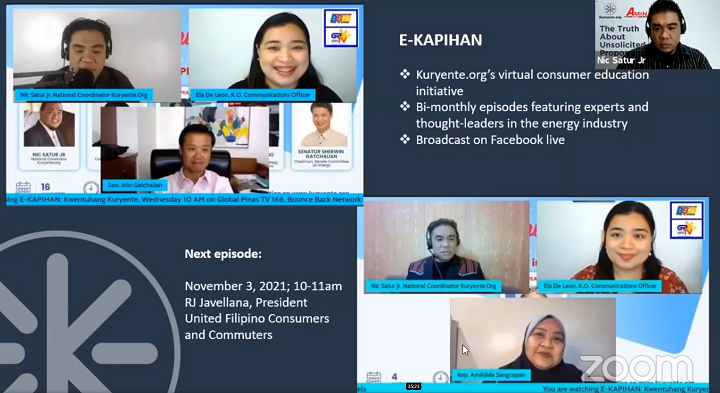
A group of representatives from various sectoral groups released a joint statement today, titled “Commit to Uphold Electricity Consumer Welfare by Rejecting the Unsolicited Mechanism in the Energy Sector” expressing opposition against Unsolicited Proposal in the Department of Energy (DOE).
Led by consumer welfare organization, Kuryente.org, the Joint Manifesto was presented during a press conference held on October 26, and was signed by representatives from various business, consumer, youth, and advocacy groups from around the country. The Manifesto resisted the proposed amendment to the Competitive Selection Process (CSP) that seeks to accommodate Unsolicited Proposals for power supply to distribution utilities and electric cooperatives.
“The Department of Energy should abandon the move to weaken competition in the energy sector. Implementing Unsolicited Proposal effectively brings us back to the regime of negotiated/direct procurement of power supply agreements, which proved problematic,” said Kuryente.org National Coordinator Nic Satur Jr.
That is why the CSP was implemented in the first place to promote healthy competition leading to a reduction of rates. We call on Rep. Mikey Arroyo, chair of the House Committee on Energy, to urgently hear HR 1874 filed by AMIN Partylist Rep. Amihilda Sangcopan,” he added.
For her part, Rep. Sangcopan called the proposed amendment “unconstitutional”, citing the EPIRA Law.
“Allowing unsolicited proposals breeds unfair competition since it gives distribution utilities and electric cooperatives to collude with power generators by cooking terms of reference and by potential abuse of the original proponent status. We want to encourage fair and open competition, not curtail it.”
“Hindering open and just competition in the power industry consequently jeopardizes the welfare and rights of Filipino consumers for reliable, accessible, affordable, and sustainable supply of electricity. Consenting to Unsolicited Proposals, is like allowing consumers (like us) subjected to further hardship, helplessness, and abuse. Unsolicited Proposal violates quite a number of constitutional guarantees, and the EPIRA Law,” said Rep. Sangcopan.
For parent and work-from-home employee Mel Salda, the prospect of higher energy rates due to Unsolicited Proposal makes her anxious.
“The pandemic pushed most of us to work remotely and dramatically increased our electricity consumption and consequently our cost of living. DOE’s priority right now should be making the cost of electricity accessible and easing the burden of consumers instead of adding to it,” said Salda.
“Unsolicited Proposal of the DOE is making me more anxious — am I just working to pay for my high electric bill? Are we racing to become the most expensive electricity in Asia? If that is the case, should we also call for wage increase or household electricity subsidy?” she added.
Same is the predicament of consumer welfare advocate Ricky Juab from Misamis Occidental:
“Direct negotiation because of unsolicited proposal will only increase consumers being left in the dark, it will be an added burden and will not solve any problems that we are facing such as high cost of daily power interruptions as in the case of MOELCI and many other electric cooperatives across the country, outside Metro Manila. We want to have a happy Christmas and we hope that the Department of Energy will allow us that. Energy consumer welfare issue is not just an economic rights issue but should also be a political or electoral issue.”
Juab serves as the spokesperson for aggrieved consumers of the Misamis Occidental Electric Cooperative, Inc. (MOELCI) and is also one of the signatories of the joint manifesto.
Earlier in June, in response to the published DOE call to amend the CSP, Kuryente.org reached out to AMIN Party-list Rep. Sangcopan to investigate the move of the DOE as unnecessary, and will only benefit corporate interests that are disadvantageous to Filipino consumers.
“The DOE, despite numerous requests from consumers to justify the need to weaken the competition in the energy sector, failed to satisfy the basic question why amending the CSP is necessary, and now they said that a memorandum on unsolicited proposals will come out in October. We hope Congress, on behalf of the electricity consumers, will exercise their oversight function to stop DOE in its tracks,” Satur said.

